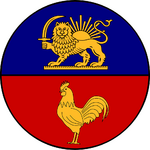Daniyal al-Osman
 | |
| Former Prime Minister of Hurmu | |
|---|---|
| Began | 5.VIII.1690 AN |
| Ended | 11.II.1713 AN (23 AN years) |
| Predecessor | Jan Spiik |
| Successor | Patrik Djupvik |
| Cabinet |
1st cabinet (CDH-LPP-Koos-Mod.; 1690–1695) 2nd cabinet (CDH-Edasi-Mod.; 1695–present) 3rd cabinet (CDH–SY–Edasi) 4th cabinet (CDH–SY–Trad.–Ayr.) |
| Party |
Coalition for Democratic Humanism Humanist List |
| Physical description | |
| Gender | Male |
| Species | Human |
| Skin colour | Black |
| Biographical information | |
| Father | Tokaray al-Osman |
| Mother | Isabella Simrani-Kalirion |
| Spouse(s) |
Liv Dravot (m. 1659, widowed 1664) Ghawetkiin Enkhjargal (m. 1691) |
| Date of birth | 1645 AN |
| Date of death | 13.XII.1717 AN (aged 72 AN years |
| Place of death | Aqaba |
| Former Senator of the Lakes | |
|---|---|
 | |
| Tenure began | 1.VIII.1690 AN |
| Tenure ended | 24.XV.1712 AN (22 AN years) |
| Senate(s) | VI, VII, VIII, IX |
| Elected | 1690, 1695, 1701, 1707 |
| Faction | Humanist |
| Order of the Holy Lakes | Lines of Andelarion, Osman and Tahmaseb |
| Physical description | |
| Biographical information | |
Daniyal al-Osman (born 1645, died 1717) was a Hurmu politician of Babkhi heritage, Minister of Finance and Economic Affairs (1716–1717), prime minister (1690–1713) and senator of Hurmu (1690–1712). Director of Director of Apollonian Operations for the Honourable Company (1690 AN–1717 AN). Commandant of the ESB-Holïurs-Afzælt (1690 AN–1717 AN). Acclaimed as Archon of the N&H Coalition for Democratic Humanism on 10.I.1694 AN which office held until surrendering control of the party to Jamshid-e Osman in 1716 AN.
The son of Isabella Simrani-Kalirion (1603–1670 ) and Tokaray al-Osman (1582-c.1650), Daniyal al-Osman was a member of both the House of Ayreon-Kalirion and the House of Osman. He was a direct descendant of Prince Andelarion, and was therefore a member by birth of the Order of the Holy Lakes. His siblings are Daniyal ibn Daniyal Simrani-Kalirion, Aurangzeb Tokaraizadeh al-Osman, Adam al-Osman, and Esmeralda al-Osman.
Married to Liv Dravot née Djupvik from 1659 until her death in 1664. In this marriage, Daniyal explored his wife's Hurmu heritage through intensive studies. He moved to Hurmu in 1689 to assist with the Hurmu Trust Territory's proposed reunification with Lakkvia. Following reunification, he was briefly the minister of fisheries in the cabinet of Jan Spiik (13.VI.1690–19.VII.1690). Despite his short tenure, he was credited with beginning the modernisation of the entire fishing fleet of Hurmu, by securing funds from donors around the world sympathetic to the Hurmu cause.
Following the elections of 1690, he was elected both to the Senate of the Lakes and the premiership of Hurmu. His cabinet was inaugurated on 19.VII.1690. Upon taking office the new Prime Minister, in a gesture of his commitment to the realm, requested of Temüjin, the Khan of Lontinien, the provision of a suitable daughter from his clan to serve as his consort. On the morning of 24.VII.1690, he met with Temüjin's adopted granddaughter, the folk singer Ghawetkiin Enkhjargal. After six hours together, they agreed that they would marry one another, and their betrothal was announced. Their marriage was solemnized in Ghawlama, in traditional Lontinian rites, on 7.IV.1691.
On 7.II.1692, Enkhjargal gave birth to Daniyal al-Osman's son, Temüjin Tokaray Erdenechuluun al-Osman. A daughter followed in 1694 AN, who was announced at a blessing ceremony held in 1697 AN at Ghawlama as Azardokht Boragchin Erdenechuluuniin al-Osman.
Re-elected to the Senate in 1701, he was nominated as Prime Minister once more on 4.I.1702 by the Assembly of Representatives. The Senate confirmed this on 5.I.1702, effective the day after, when Daniyal al-Osman announced his third cabinet. Thereafter, led a fourth, fifth and sixth cabinet before announcing his intention to resign following the 1712 Hurmu general elections. Surprisingly returned to cabinet as Minister of Finance and Economic Affairs during the 1716 political crisis. It was however evident from the moment of his return that he intended to remain in office only long enough as to ensure that the moment of crisis had passed and would not be seeking to revive his political career.
Concurrent rumours were beginning to spread in Aqaba and Tiegang that he was also planning to set aside the directorship assigned to him by the Honourable Company, with the intention of ensuring it transferred into the capable hands of his wife, who had this far proven herself during her stewardship of the Humanist faction in the Senate of the Lakes.
Death and funeral
Although he had endeavoured to maintain the semblance of a nonchalant, even disdainful, attitude concerning the disgrace of his son Temüjin, who had shamefully abandoned his post as Minister for Moorland on 6.XI.1717 rather than accept recall to Huyenkula, the shock and the shame engendered by the news had taken its toll, and on 11.XI.1717 he had collapsed in the boardroom of the Honourable Company in Aqaba, being swiftly hospitalised and admitted into the intensive care ward at Aqaba General Hospital immediately upon his arrival. His death was subsequently announced to gathered members of the Hurmu and international press assembled in Aqaba in the night of 13.XII.1717.
Daniyal's body was transported to Ghawlama, where the Senate, in coordination with the family, organized a state funeral for Daniyal.
As per Daniyal's wishes, his funeral was to be a combination of Lontinian Lamaist and Zurvanist rites. The family had consulted with both Lontinian Lamaist and Zurvanist priests to ensure that the ceremony was a true reflection of Daniyal's beliefs.
Guests from all over the world had arrived to attend the funeral, including the most prominent members of the Order of the Holy Lakes, of which Daniyal had been a member. However, there was a noticeable absence of Daniyal's eldest son, Temüjin, who had been banned from attending by the family due to what he caused to happen to Moorland.
The funeral ceremony began with the Lontinian Lamaist priest chanting sutras while the Zurvanist priest performed prayers and recited verses from the Avesta. Enkhjargal and her children stood beside the coffin, their eyes filled with tears as they listened to the priests' words.
As the ceremony continued, Engkhjargal felt a sense of peace wash over her. She knew that Daniyal was at peace, and that he was now in the hands of the divine. Aurangzeb, too young to fully comprehend the significance of the ceremony, held onto his mother's hand tightly.
After the ceremony, the family and guests made their way to the Tower of Silence, where Daniyal's body was to be exposed to the elements and picked clean by vultures. The family watched on in silence as the birds circled above, and finally descended to do their sacred work.
As the sun began to set over the Tower of Silence, Engkhjargal and her children said their final goodbyes to Daniyal. They knew that his spirit would live on forever, guided by the Lontinian Lamaist and Zurvanist priests' prayers and rituals.
In the days that followed, the family held a reception to honor the memory of Daniyal al-Osman, and to thank the priests and guests for their attendance. Though their hearts were heavy with grief, they knew that they had given Daniyal the funeral and burial that he would have wanted, one that honoured his beliefs and celebrated his life.
Honours
| Preceded by: Jan Spiik |
Prime Minister of Hurmu 1690–1713 |
Succeeded by Patrik Djupvik |
| Preceded by: Position created |
Minister of Fisheries (Hurmu) 1690 |
Succeeded by Viljo Kuusik |
| Preceded by: Ürimbay Bayböri |
Minister of Finance and Economic Affairs (Hurmu) 1716 |
Succeeded by Fahime Jafarnejad |